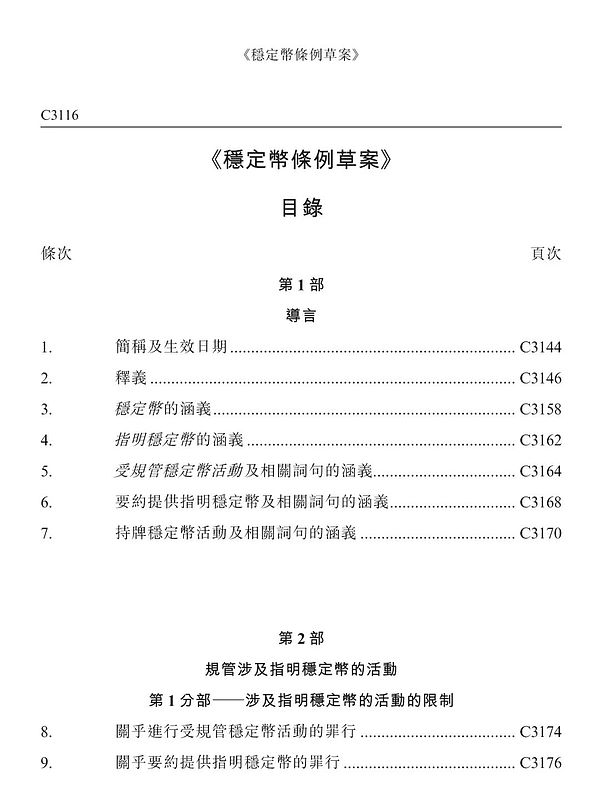
Source: Beosin
On December 6, Hong Kong announced the much-anticipated Stable Currency Bill. This legislation provides a detailed regulatory framework for issuers of fiat-referenced stablecoins (FRS) and aims to establish Hong Kong as a global leader in the field of virtual assets.
This landmark initiative addresses core issues related to the FRS, including financial stability risks, user protection needs and regulatory clarity. By implementing these measures, Hong Kong not only hopes to enhance public trust in the stablecoin ecosystem, but also seeks to unleash the full potential of virtual assets and its underlying blockchain technology in financial innovation and economic growth.
The "Stablecoin Bill" proposes the main regulatory requirements for the issuance and operation of stablecoins:
1. Capital requirements• Must hold at least 25 million Registered capital in Hong Kong dollars, or its equivalent in an approved foreign currency. Licensed institutions should have sufficient financial resources to meet their financial obligations and meet other financial resource criteria.
2. Supervision of Reserve Assets• For each stable currency, an independent reserve asset portfolio must be established to ensure that its market value is at least equal to the face value of the unredeemed stable currency.
• The reserve portfolio should be managed separately from other assets of the institution.
• Reserve assets should be selected as high-quality, highly liquid, and low-risk investments.
• Implement rigorous risk management and audit processes.
• Disclose to the public the management, risk control and audit results of reserve assets.
3. Stablecoin Redemption Mechanism• Licensed institutions must provide unconditional stablecoin redemption rights and must not impose unreasonable restrictions.
• Exchange requests must be processed promptly and paid in agreed assets, less reasonable fees.
• In the event that the licensed institution becomes insolvent, currency holders have the right to exchange their stablecoins on a proportional basis.
4. Personnel qualification requirements• Licensed institutions need to ensure that all shareholders are clearly identified and have corresponding qualifications.
• Key positions such as CEO, Director, Stablecoin Manager, etc. must be filled by the right people.
• Senior managers should have the necessary expertise and experience to perform their responsibilities.
5. Risk Management• Licensed institutions must develop comprehensive risk management to ensure information security, prevent fraud, and have emergency response capabilities. They must also comply with the regulations approved by the Financial Controller.
6. Anti-Money Laundering and Combating the Financing of Terrorism• Licensed institutions must establish measures to prevent money laundering and terrorist financing related to stablecoins and ensure compliance with the Anti-Money Laundering and Combating the Financing of Terrorism Regulations and related measures.
7. The purpose and soundness of stablecoin issuance• The purpose, business model and operational arrangements of licensed institutions for issuing stablecoinsMust be robust to avoid potential risks.
8. Business scope restrictions• Licensed institutions should focus on stablecoin business and obtain approval from the Financial Supervisory Commissioner before conducting other businesses, while ensuring that other business activities will not pose significant risks to the stablecoin business. .
9. Information disclosure requirements• Licensed institutions must publish a white paper to provide comprehensive and transparent information about stablecoins, and disclose information such as complaint handling and compensation mechanisms, stablecoin management and risk assessment.
10. Complaint Handling Mechanism• Licensed institutions must establish and implement an effective complaint handling and compensation mechanism to ensure that currency holders can resolve their problems conveniently and efficiently.
11. No interest• Licensed institutions shall not pay interest on stablecoins, nor shall they allow any form of interest payment.
12. Orderly downsizing and recovery plan• An orderly downsizing mechanism must be established to ensure that the exchange of stablecoins can proceed in an orderly manner. Licensed institutions should have appropriate contingency plans in place.
In order to effectively implement the system, the Bill also proposes to give the Monetary Authority the necessary supervisory, investigative and enforcement powers.
Secretary for Financial Services and the Treasury, Hui Ching-yu, said that this legislative proposal is crucial to fulfilling Hong Kong's obligations as a member of the Financial Stability Board. Adhering to the principle of "same activities, same risks, same supervision", the legislative proposals focus on risk-based and strive to create a stable regulatory environment, which is also consistent with Hong Kong's regulatory approach to virtual assets.
President Yu Weiman of the Monetary Authority said that the legislative proposals were subject to extensive consultation and the opinions of the industry were fully considered when determining the details of the regulatory system. He believed that a robust regulatory environment would help promote the sustainability of Hong Kong’s stablecoin ecosystem. and develop responsibly.
This comprehensive regulatory framework is designed to ensure the stability, security and transparency of the stablecoin ecosystem while protecting the rights and interests of relevant stakeholders. The Bill is scheduled to be reviewed for the first time in the Legislative Council on December 18. Its future implementation will be an important step in promoting the further development of Hong Kong’s virtual asset ecosystem.
With this legislation, Hong Kong has demonstrated its firm determination to coexist compliance and innovation in the global virtual asset field.














